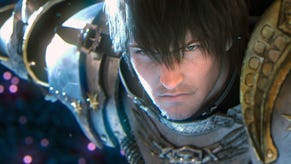Naoki Yoshida on Dawntrail criticism, community feedback, and the future of Final Fantasy 14
"As an MMO player myself, I know the greed!"
When Dawntrail, the latest expansion for MMORPG Final Fantasy 14, was released back in June, it marked the start of a new story arc. After a decade of growing popularity across multiple expansions telling a singular narrative, Dawntrail brought players to a brand new world with new characters and a fresh graphical update.
It was met with a somewhat mixed reaction. While the visuals and music are as gorgeous as ever, the storytelling was criticised by some for being meandering with its shallow first half, and many of its familiar characters (the Scions) are given considerably less screen time.
Yet Final Fantasy 14 remains a spectacularly popular game, its players always eager for new content. Naoki Yoshida, the game's producer and director, is a beloved figure in the game's community and - through livestreams and Fan Fest events - is in direct communication with players.
So when I had the chance to speak with Yoshida at this year's Gamescom, I took the opportunity to ask about Dawntrail criticisms, community feedback, and what could be next in Final Fantasy 14's extensive story.
I want to start by discussing Dawntrail and some of the criticisms from reviews, including a slightly slower story, it being a game of two halves, and some of the Scions not quite getting enough screen time. How much of that do you listen to? And how much will that impact future expansions?
Yoshida: With the new expansion, specifically regarding the first half of the story, we did receive feedback saying the tempo wasn't good and it could have been sped up a little more, but considering this was a new adventure that we were going on, we were journeying into a new land, we were meeting new people, and we were coming into contact with new cultures, we went through a process of making sure to create and showcase these aspects in a very attentive way.
For us in the development team, the story did progress as we planned. The key things we had in mind for this adventure were for the player to know about where they are going, for them to learn things about where they're going, and then for them to discover things where they're going as part of the adventure. But as a result of that, we did receive feedback that the tempo was slow, and I do understand that some players were frustrated. Looking back on it, we could have perhaps spread some of those elements - which were incorporated in the main scenario - we could have diverted them to side quests. In this regard, it is a little bit similar to 2.0.
However, when things become more complicated later in the story, if we haven't gone through that process of ensuring the player knows about the world they are in, they won't really know what's going on. So on the one hand, there were players who appreciated being able to learn in detail about everything in advance. On the other hand, there was another group of players who just wanted to progress at a faster pace. And I completely understand where they are coming from as well. So once again, we could have diverted some of those aspects to the side-quests, so for players who were interested in learning more they could just go and do the side-quests. However, this is one learning we've taken on and we would like to make the best of this moving forward in our development.
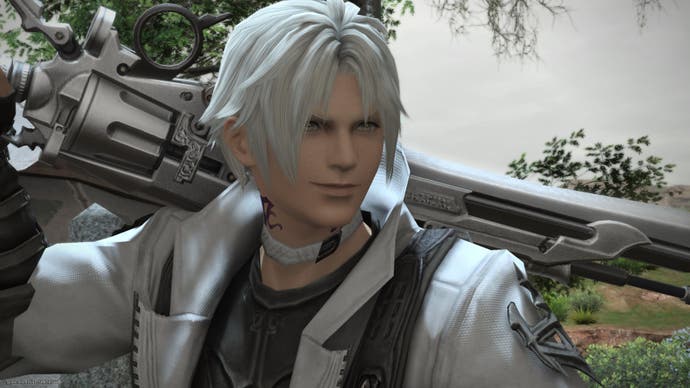
With regards to the Scions playing a more active role only later on in the story, truth be told this is something I intentionally wanted to try out. I do understand there are people who always want the Scions to be at the centre of the story, but at the same time there are people who are also requesting something new instead. So it was a conscious effort on my part to experiment and see how the balance would play out.
We're really at the limits of what we can do in terms of showcasing [the Scions] to the fullest in the story. If we wanted to have them all stand out as key parts of the cast in a new expansion, and to be part of that one story, it's an extremely difficult process. I think moving forward, we would have to consider certain situations. For example, maybe only half of the Scions appear in the story, or maybe there would be a story where only Alphinaud and Alisae play a part. Unfortunately, we have to take this approach, otherwise we will not be able to create a story that we would be satisfied with ourselves. On the other hand, I do understand that if we do take that approach, there will always be complaints. Some people might be saying, 'Hey, why isn't Y'shtola there?' But it's just the case that, because we are at our limits, we can't always have that all-star cast. This is something that we will need to consider moving forward.
You're very close to the community, such as with Fan Fest and livestreams. Is there a danger of listening too much to players? For instance, with recent changes to the Viper Job, how do you balance doing what you want to do and also listening to the community?
Yoshida: Firstly, with regards to why I keep a close distance to the community, I think that's not really an appropriate way to approach it, but rather to me it's really important to have a mutual understanding between both sides in this genre.
Starting back with Ultima Online, I've played a lot of MMOs in my time, and my history as an MMORPG player is really long. I know [developers will] release patch notes and there is a group of players who don't read them. And the patch notes only explain about what has changed, so certain players will read them and be like, 'Hey, why have they gone and nerfed my class? Why have they adjusted my job?' And I have encountered this kind of situation time and time again over the years.
Of course, whichever development teams are behind those games, I believe they must really want their players to enjoy the game, and that's what's behind their motivation for updating it. However, the desire to carry out those changes and the need to carry out those changes are not accurately conveyed to the players, and consequently, amongst the playerbase, they have an increased sensation of frustration. Then players themselves start to suspect developers are not even playing their own game. As a result, a lot of people start dropping out of the game, and that has a negative impact on the developers: the people in charge in the development team will change, and it just continues to go downward from there. I've encountered this kind of situation again and again during my time as a player.
With Final Fantasy 14, you can look at it as our world, but to put it another way, we can say it's our country of sorts. We need to make rules within the game so there's a sense of order and everyone can follow those common rules. For example, with regards to battles, there would be rules set out in relation to DPS, and those rules would be set forth from our side. Naturally, because we are the people who are operating the game, we need to be the ones making those rules. But players need to understand, why are those rules there? Why are things nerfed for a certain reason? They would question why those things happen. But if we from the development and operation side clearly explain those reasons, players might be able to understand. At the same time, it's not good that a certain job might be too strong. So then, even if players are completely satisfied, they can understand where we are coming from as well.
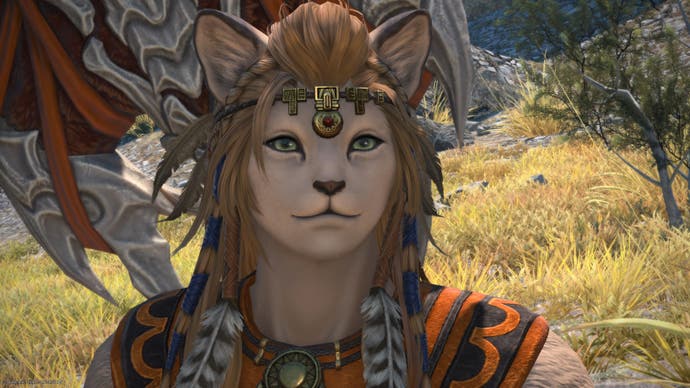
It's striking that balance, which is really important, and I think it's having the players understand our intentions. That's what I mean when I say a mutual understanding, so they can understand the reasons why we are making those rules. By going through this process of communication, we can also see the aspects they enjoy. On the development side, we can get a glimpse into what could be adjusted to ensure they're happy as well. That is the main motivation and the main reason why I have a policy of communicating so much to the players.
With regards to the changes for Viper, we had adjusted right until the last minute and we did have in mind the possibility that some players might provide feedback that it was too busy to play. We did release the job in that state, and then we found a lot of players say it was very busy to play to the extent that they were not able to see mechanics.
The battle team, right until the last minute, were considering whether to make any adjustments to the job. The battle director actually consulted with me because he was quite torn about whether they should go through with an adjustment or not. We announced that we were considering making adjustments to the job, but the response to that was a lot of feedback from players who had already reached the level cap and were already used to playing with the job, and they were happy with the way it played. However, we had already identified some actions which would inevitably be a cause of stress for players. Eventually, we just went through with adjusting what we had initially planned, and that was unrelated to the community feedback. However, I believe probably there was some misunderstanding on the community's part.
I do remember on social media, especially in North America and in Europe, some people were saying, 'Hey, Yoshida, you're listening too much to community feedback', but that was only a little bit so really you don't need to worry.
With each expansion the game has grown massively: there are new characters, new areas, new jobs. Do you foresee a point where it's too big and unwieldy, and how are you aiming to avoid that?
Yoshida: For the fact that players would not be able to complete all content, as an MMO player myself, I know the greed!
In Final Fantasy 14, we have a lot of different content. Players can enjoy the game in a lot of different ways. There are many housing enthusiasts who are completely indifferent to Ultimate Raids, so it doesn't matter to them whether the Ultimate Raids are there or not. On the other hand, we do have hardcore battle players, so they are super interested and invested in the Ultimate Raids, but they might not necessarily be so interested in housing. And again, we have a group of players really interested in fishing.
Those people who are really hardcore Ultimate Raiders, they probably want to get an Ultimate Raid in every patch update, and the people who are really into their housing probably want more types of houses with every patch, they want bigger plots, they want more possibilities for customising their house. I don't think there's going to be people who say, 'Oh no, we don't want any more content'. They wouldn't say that.
For me, the ideal for an MMO is to have so much volume of content that you cannot actually play through it all, because what I have in my mind is that you would log into the game and you would just think to yourself, 'What should I do today? Should I do this? Or should I do that?' There's so much volume there that you can just consider, like you would in real life, what you want to do based on your mood. We want to continue to expand the game, continue to create new content, and also continue to maintain our older content so that it's always relevant for people who want to try it out. I think doing this is necessary to continue as an MMO.
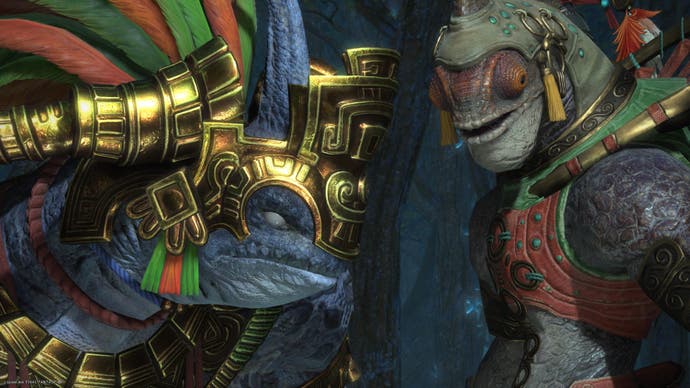
In terms of the game's story, we're in The Source and we've been to a couple of Reflections like The Void and The World of Light. Can we expect to go through all of them, and all of the elements, over time?
Yoshida: It might be possible, but on the other hand, it might not be possible. Possibly we would be going down the route of a multi-universe, so things involved in parallel worlds.
If we were to give you a hint that we would be going to all of the Reflections in the next expansions - and let's say we've already been to Reflection A, so people would know we would be going to Reflection B or C next - there wouldn't really be a sense of excitement. We want to ensure that we keep that excitement, so that's why we don't really go into the specifics.
Oh and I forgot also one additional element: there is still the past and the future.
I really don't want to limit the possibilities of what could happen, because we really do want to keep our players excited and thinking about what will happen next. And I'm a little bit of a jokester myself, so I do hope that you'll look forward to what might come.
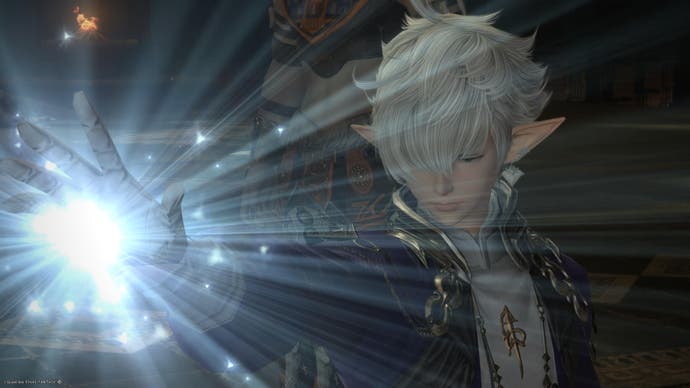
Dawntrail also marks the release of the game on Xbox. How has that helped to grow the success of the game and grow the audience? Do you feel there is a market for Japanese games on Xbox?
Yoshida: Players have been waiting a long time for the Xbox release [of Final Fantasy 14], but I'm happy to say that we've seen a really strong response on Xbox, we've seen communities starting to establish and now they're growing. We've had a pretty good response on Xbox.
With Final Fantasy 14 as an opportunity, we can take this opportunity to strengthen the community on Xbox towards the Final Fantasy franchise. I think this is where we would take more communication and work on establishing the community moving forward. And this is important, not for Final Fantasy 14, but, I would say, for Square Enix. With Final Fantasy 14's release on Xbox, Phil Spencer spent a lot of his time and a lot of effort and put in a lot of hard work into making it a reality. So we would like to make the best of that and further deepen the relationship with Xbox gamers moving forward.
I want you to just take this as a general argument, but when it comes to the Xbox platform and the fact that it was difficult for Japanese titles to be released on the platform, that's tied into the fact that in the Japanese market there is an extremely low number of users on Xbox. And naturally, because we are Japanese developers, we have a desire for many people in our country to play our games. I think that applies to developers in any country, whichever country they come from, they want many people from their own country to play their games. Because of that, it's really a tough point in terms of a business standpoint. I think that's generally one perspective of how you can look at things in terms of the situation.
However, at Square Enix, we have been changing our policy. So now we are moving towards the policy of releasing our games on a multiplatform basis, and we really want as many players as possible to play our titles. So with Final Fantasy 14 as the starting point, we do want to release more Square Enix games on Xbox, and there will be more of our titles released on Xbox. So I hope players will look forward to future things to come on the platform.
This interview has been edited slightly for clarity.








